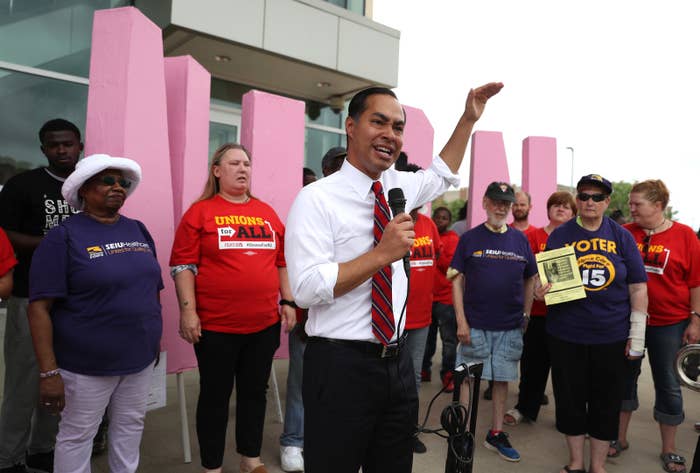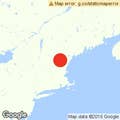
MANCHESTER, New Hampshire — Julián Castro, the only Latino candidate running for president in 2020, thinks many Americans are missing something crucial about what it means to be Latino in America today.
Castro said he understands why he’s routinely asked by reporters why he doesn’t speak Spanish, while other third-generation Americans like, say, President Donald Trump, are not asked about their linguistic abilities.
Part of that, Castro says, is because there are just more immigrants to the US today who speak Spanish than those who speak German. But, he told BuzzFeed News in New Hampshire recently, “it’s also because a lot of folks still have a very one-dimensional view of what it is to be Latino in the United States.”
“They think that everybody just got here five minutes ago. And so you’re more quickly identified as somehow being foreign to this country, and so I think a lot of people just think, ‘why don’t you speak that other language,’ not in addition to English.”
Castro is at a make-or-break moment for his presidential campaign: After standing out in the first Democratic debates, chiefly through an intense back-and-forth on immigration policy, and a subsequent surge in donations, he is still struggling to get sustained attention from voters and is at risk of not meeting the polling requirements for September’s debate. These few weeks, culminating in next week’s debate in Detroit, could be his best chance to keep his campaign alive.
“I recognize that I need to do well, and I’m confident that I can do that,” he said over a morning iced tea at his hotel in Manchester, New Hampshire, last Friday in the middle of a swing through the early primary states.
Castro is wary of being pegged just as the Latino candidate, or the immigration candidate, not someone with a broad set of ideas to offer (he acknowledged that some of this is “a two-way street,” because he was the first candidate to put out an immigration plan and has focused on it).
“You’ll be put in a box if you don’t try and get out of the box, right? So we can do everything we can to make sure that people understand my full, strong vision for the country, not just one part of it,” he said.
Castro puts part of the “lack of understanding of the context of the Latino presence in the United States” down to a US media landscape that remains overwhelmingly white, especially among top editorial positions at major news organizations. That’s a lack of diversity he also sees at the highest levels of politics.
“It’s a shame that so few of us have run for president before,” he said. “We need a stronger pipeline” for people of color both in politics and media, he said.
“Our country is more diverse than ever, but newsrooms have not kept up with that, and the coverage suffers because of that,” he said. “That all plays into just how many people understand the context of why I wouldn’t speak fluent Spanish.”
Asked directly what it means to him to be running for president now, particularly at a time when the incumbent president has a track record of saying overtly racist things, he has in the past tended to demur, saying that while “there’s special meaning for a lot of [Latinos] in seeing me run right now for president,” he is “a candidate who can speak to everybody,” as he told BuzzFeed News in an interview in May.
“So I’m trying to do both of those things,” he said in May. “Be a candidate for all Americans but also of course recognize the special significance to the Latino community, because there aren’t a lot of people who look like me who run.”
That’s struck a chord with some voters, like Yvonne Garcia, who attended the League of United Latin American Citizens convention in Milwaukee earlier this month, after seeing Castro at a town hall event organized by the group.
“I think part of him says yes, I am Latino and I am who I am, but he doesn’t want that to be the main focus, I get that vibe from him. And he’s very authentic,” she said.
Trump has continued to keep race at the forefront of the presidential campaign, with racist language and anti-immigrant policies. Castro talked at length Friday about how potentially being the first Latino president of the United States has shaped his campaign, and what his trajectory so far says about American multiculturalism.
“We’re far enough into the civil rights movement to understand that it’s not just the representation that matters, it’s also what you do when you’re there, and that brings it full circle to the question of immigration and what I would do if I’m president,” he said. “What does it matter if I’m Latino or not? I can use some of that experience to understand how we need to ensure that more people of different backgrounds can prosper in this country and reach their dreams, that’s what I’m trying to do,” he said.
Last week the president set off another news cycle driven by his racist language after telling four women of color in Congress to “go back” to where they came from, which culminated in a crowd at a Trump rally targeting Somali American Rep. Ilhan Omar with the chant “send her back.”
“It’s important for the people that he’s trying to sing a siren song to, for white America, to speak up against him specifically,” Castro said. “And I’m proud to see that a lot of folks are.”
At a Friday bookstore meet-and-greet in Concord, New Hampshire, Castro talked to the mostly white New England audience about his stance on immigration, but got the most enthusiastic response when he talked about health care, education, and overturning the Supreme Court’s Citizens United v. FEC decision.
Millie La Fontaine, a retired neurologist, said she was “impressed but a little scared” after hearing Castro talk.
“A lot of them check a lot of boxes for me, I think Mr. Castro does as well,” she said.
“He said, ‘yes I can come in there and I can go toe to toe with Trump,’ but I thought he was a little bit too brash, a little bit too me, me, me, about an issue that would potentially label him as a ‘they want open borders,’ which is not a tactic that I think is going to work against Trump.”
Shannon Mills, a Concord resident whose hometown is San Antonio, said he thinks Castro “did a good job there, he was very highly regarded as a mayor.”
But, he said, he’s looking for a presidential candidate who “doesn’t scare anti-Trump Republicans, doesn’t scare moderate Democrats.”
He cited progressive immigration policy as one thing that is “frightening to some people because, sadly, they share some of the fears that Trumpistas have.”
Castro said that in the wake of his debate success, he is “on a lot more people’s radar screens” and “in their top three candidates.”
He added that it seems like people are “taking [his candidacy] more seriously.”
“If people believe that they actually are 50 feet from the next president of the United States, or could be, they’re going to stick around for a picture and to try to talk to the person more,” he said.
Of around a dozen people who spoke to BuzzFeed News at the event in Concord and a town hall in Nashua, New Hampshire, the evening before, all said they knew more about Castro after the debate than they did before, and most said they felt he was smart, qualified, and had a clear vision. But the candidates who made their top three were, repeatedly, Elizabeth Warren, Joe Biden, Kamala Harris, and Pete Buttigieg. Castro was just outside.
CORRECTION
The US region of the Concord, New Hampshire, audience was misstated in an earlier version of this post.

